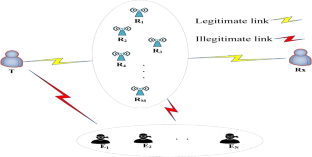Annals of Telecommunications ( IF 1.9 ) Pub Date : 2024-04-18 , DOI: 10.1007/s12243-024-01034-4 Anil Kumar Kamboj , Poonam Jindal , Pankaj Verma

|
Physical layer security (PLS) has cropped up as a promising solution to secure the wireless network. Cooperative communication is capable of improving the PLS, in addition to increasing the coverage area and reliability. It applies to diverse wireless systems, including long-term evolution (LTE) cellular systems, mobile ad hoc networks, and wireless sensor networks. The selection of relay and jammer nodes from the cluster of intermediate nodes can easily counter the strong eavesdroppers. Existing techniques of joint relay and jammer selection (JRJS) solve the optimization problem to find near-optimal secrecy. However, due to their computational complexity, most of these algorithms are not scalable for large networks. In this manuscript, we introduced the multi-agent deep Q-learning (MADQL) algorithm for secure joint relay and jammer selection in dual-hop wireless cooperative networks. The JRJS is transformed into a prediction-based problem and solved using deep Q-learning algorithms. The proposed reinforcement learning technique is model-free and best suited for situations where the exact global channel state information (CSI) for all the links is unavailable. The secrecy performance of the introduced algorithm is compared with the existing techniques. Simulation results confirmed that the MADQL-JRJS algorithm outperformed the existing algorithms.
中文翻译:

双跳无线网络中基于多智能体深度Q学习的联合中继和干扰器选择
物理层安全 (PLS) 已成为保护无线网络安全的一种有前途的解决方案。协作通信除了增加覆盖范围和可靠性之外,还能够提高PLS。它适用于各种无线系统,包括长期演进 (LTE) 蜂窝系统、移动自组织网络和无线传感器网络。从中间节点集群中选择中继和干扰节点可以轻松对抗强窃听者。现有的联合中继和干扰器选择 (JRJS) 技术解决了优化问题,以找到接近最优的保密性。然而,由于其计算复杂性,大多数这些算法对于大型网络来说不可扩展。在这篇手稿中,我们介绍了用于双跳无线协作网络中安全联合中继和干扰器选择的多智能体深度 Q 学习(MADQL)算法。 JRJS 被转化为基于预测的问题,并使用深度 Q 学习算法来解决。所提出的强化学习技术是无模型的,最适合所有链路的精确全局信道状态信息(CSI)不可用的情况。将所引入算法的保密性能与现有技术进行了比较。仿真结果证实MADQL-JRJS算法优于现有算法。



























 京公网安备 11010802027423号
京公网安备 11010802027423号